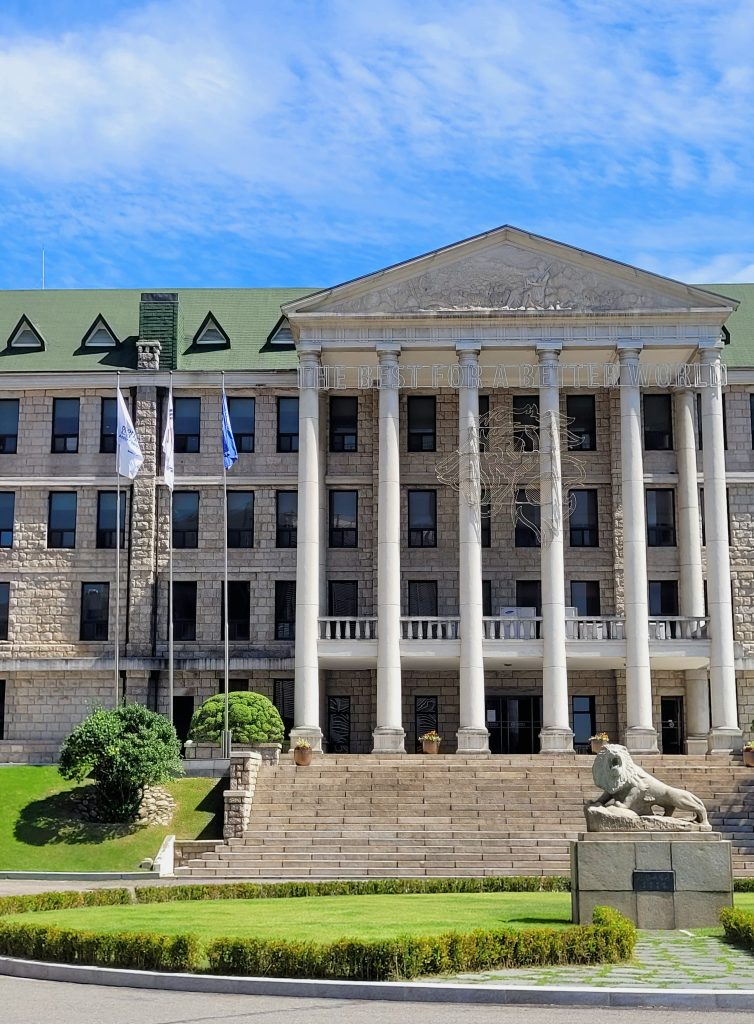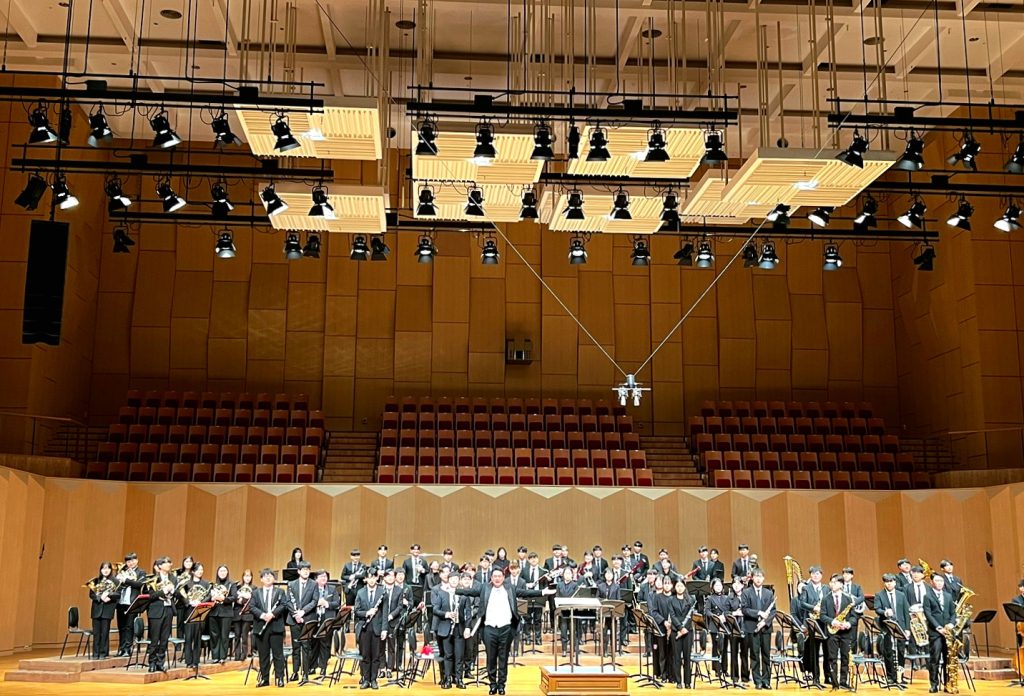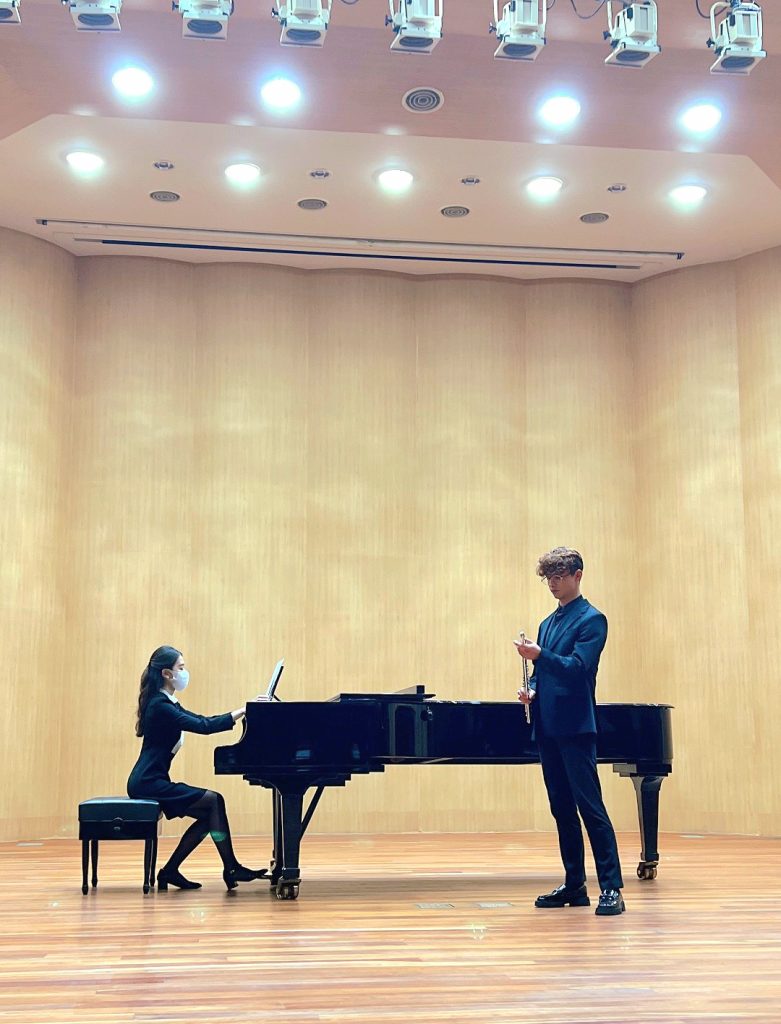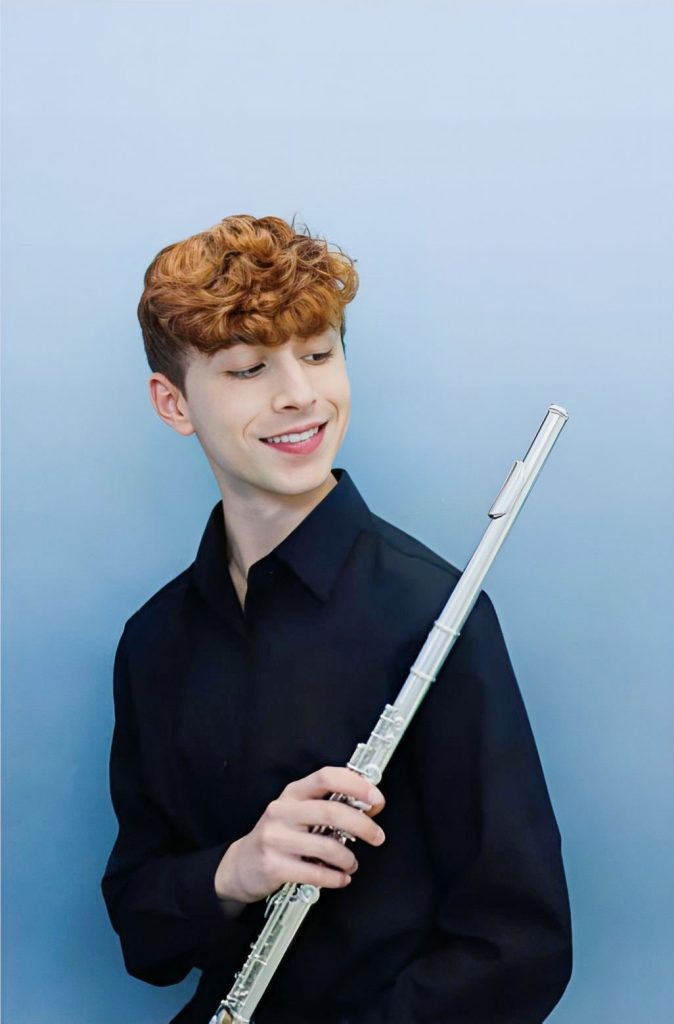View from the highest point at Hanyang University.
Photo credit: Ben Smith
During the fall 2022 semester, I embarked on the adventure of studying abroad in Seoul, South Korea at Hanyang University to study under Minji Kim and Seonah Jang, principal flutist of the Suwon Philharmonic Orchestra and third flutist/piccoloist of the Seoul Philharmonic Orchestra. Truthfully, the plan had been a long-time coming. Studying abroad was something I have wanted to pursue for many years–-it was actually the first thing I put on my bucket list in eighth grade. Back then, I didn’t know where I wanted to travel to or why I even wanted to go, but I just had a gut feeling that it was something I needed to experience. And now that I’m on the other side of it seven years later, I can attest that my gut feeling was right.
In high school, all my study abroad ambitions led to dead-ends, but as I did my undergraduate auditions, I made sure to ask if students could study abroad, whether the question was to the flute professors directly or during general university information meetings. The answers were pretty mixed. Conservatories can be a little tricky with study abroad programs that are not established through partner schools. I didn’t know this in high school. All I knew was that I wanted to experience going abroad, meet people from backgrounds other than my own, learn a new language, and just discover more about myself and the world around me in the process. I’m very grateful to Oberlin, and especially to my professor, Alexa Still, for supporting me with this endeavor. I remember when I asked Alexa if I could study abroad during my audition, the answer was met with an enthusiastic “yes!” As I came to learn, Oberlin has no partner universities in Korea, but that does not bar students from going. It just means there is a little (and by a little, I mean a lot)more logistical work that goes into the whole thing.
So, Korea. How’d I end up deciding to go there? Although I had to write many a scholarship essay on this very question, my answer has always been quite simple. It was a combination of:
1. My favorite flutists are from Korea.
2. I wanted to improve my own flute playing.
3. There was a chance of studying with said favorite flutists if I went to Korea.
It felt a little far-fetched, but at the end of the day, that was my “why.” Because I came to Oberlin with this idea already in mind, I essentially hit the ground running. By the second semester of my first year, I was in touch with professors who were helping me on track to make this plan possible. I encountered a lot of obstacles; it really did take two years of navigating for me to figure out how to pull it off. But that’s enough backstory. What was it like?
In short, I had no idea what I was getting myself into.
During my semester, I took five courses: flute lessons, piccolo lessons, wind orchestra, an audition masterclass, and a Korean language course. The language aspect was definitely a big factor during my life in Seoul. The Korean course was from 2-6pm, Monday-Friday, but wow, what a difference it made. I knew some Korean before I arrived, but I didn’t have many people to converse with. This course helped me find my bearings in Seoul, or at least manage a little small talk. My flute and piccolo lessons were taught in English–with a little Korean interspersed here and there–and so was the audition masterclass. Wind orchestra rehearsals were only taught in Korean, so that’s where I experienced the most learning curve with the language.

Photo Credit: Ben Smith
One unique experience of studying at my university was having separate flute and piccolo professors, meaning two private lessons each week. This also meant having two juries at the end of the semester…didn’t know about that part of the equation. Honestly, I didn’t realize I was going to have a separate piccolo professor or separate lessons when I signed up for the course. It made for a pretty big surprise on the first day of school. Keeping in line with this narrative, I didn’t realize I was having a piccolo jury until two weeks before it happened. When it came to this part of my time in Korea, I was just trying to make it by. Two lessons a week was difficult sometimes, but against all the odds, both the juries at the end of the semester were okay, and I made it out onto the other side unscathed. I wouldn’t have changed what happened.
I had no concept of what my performance experience would look like during my semester abroad either. I got the sense it would not be the same breadth of experience as a semester at Oberlin, because there is a limit to what exchange students can be involved in, but I took that to mean I’d have more time to seriously investigate how I wanted to improve my sound. As it happened, I had one solo performance, two wind orchestra concerts, the two juries I mentioned (실기 시험), and one recording session. Now that I’m back at Oberlin, I’m very grateful for that experience. I didn’t have nearly as many performance obligations, but the time I spent in the practice room became even more valuable because I got to explore and really think for myself.

Photo credit: 이모
All students have to perform from memory in Korea, which for me was equal parts daunting and exciting. One of the biggest culture shocks for my friends at Hanyang was when I told them that no such memorization requirement exists at my university. Of course, it varies by the instrument and the music a student is preparing, but in Korea, memorization is the expectation rather than a choice. This was particularly interesting when watching graduation recitals. The nature of a graduation recital is that it is celebratory, but I knew that my friends’ preparation for such recitals was acutely stressful. As an audience member, watching these recitals was, at the best of times, incredibly inspiring and, at the worst of times, anxiety-inducing. As a peer, watching the hard work pay off in the performances was a big relief, but I knew that that’s exactly what went into it: hard work. I left those recitals with a lot to think about. Even now, when I watch my friends perform their recitals at Oberlin, I’ve wondered if the feeling I experience when watching is any different and, if so, how. There is merit to learning a piece by heart, but coming back to the US made me think about where the difference lies in a performance that feels musical versus a performance that feels mechanical.

with my friend and pianist, Eun-hwan Pyo (표은환).
Photo credit: 허진
Overall, my experience in Korea was everything I could have hoped for. The people I met, the challenges I faced, the opportunity of it all: it was the experience of a lifetime. I’d recommend studying abroad to anyone who is interested, especially musicians. There was a language barrier present between some of my friends and me, but seeing each other perform, sharing the experience of music–-it connected us in a way words couldn’t. It gave what I do a renewed sense of purpose and, even if it’s not the takeaway I would have expected to be leaving with in eighth grade, I can say now that it absolutely fulfills the criteria of that bucket list dream.
Artist Biography
Benjamin Smith is an American flutist born in Georgia who began the flute at the age of 9. He has gone on to hold performances in France, Italy, Canada, and South Korea. As a young artist, Benjamin was featured with the Atlanta Wind Symphony in 2019 performing Otar Gordeli’s Concerto for Flute and Orchestra, op. 8 and won first prize in the 2018 Atlanta Flute Club Junior Artist Competition.
Benjamin is currently studying under Alexa Still at the Oberlin Conservatory of Music. When he lived in Seoul, South Korea in 2022, he studied with Minji Kim and Seonah Jang of the Suwon Philharmonic Orchestra and the Seoul Philharmonic Orchestra. Benjamin has performed in masterclasses for esteemed artists such as Matthieu Gauci-Ancelin, Sooyun Kim, Carol Wincenc, Mark Sparks, and Sergio Pallottelli, among others. Benjamin previously studied with Kelly Via at the Atlanta Music Academy.
This year, Benjamin was selected as an Orchestral Fellow for the National Orchestral Institute + Festival for the 2023 season in Baltimore, Maryland. He has also studied at the Interlochen Summer Arts Camp and Orford Musique.



Benjamin, your accomplishment are amazing. Congratulations!